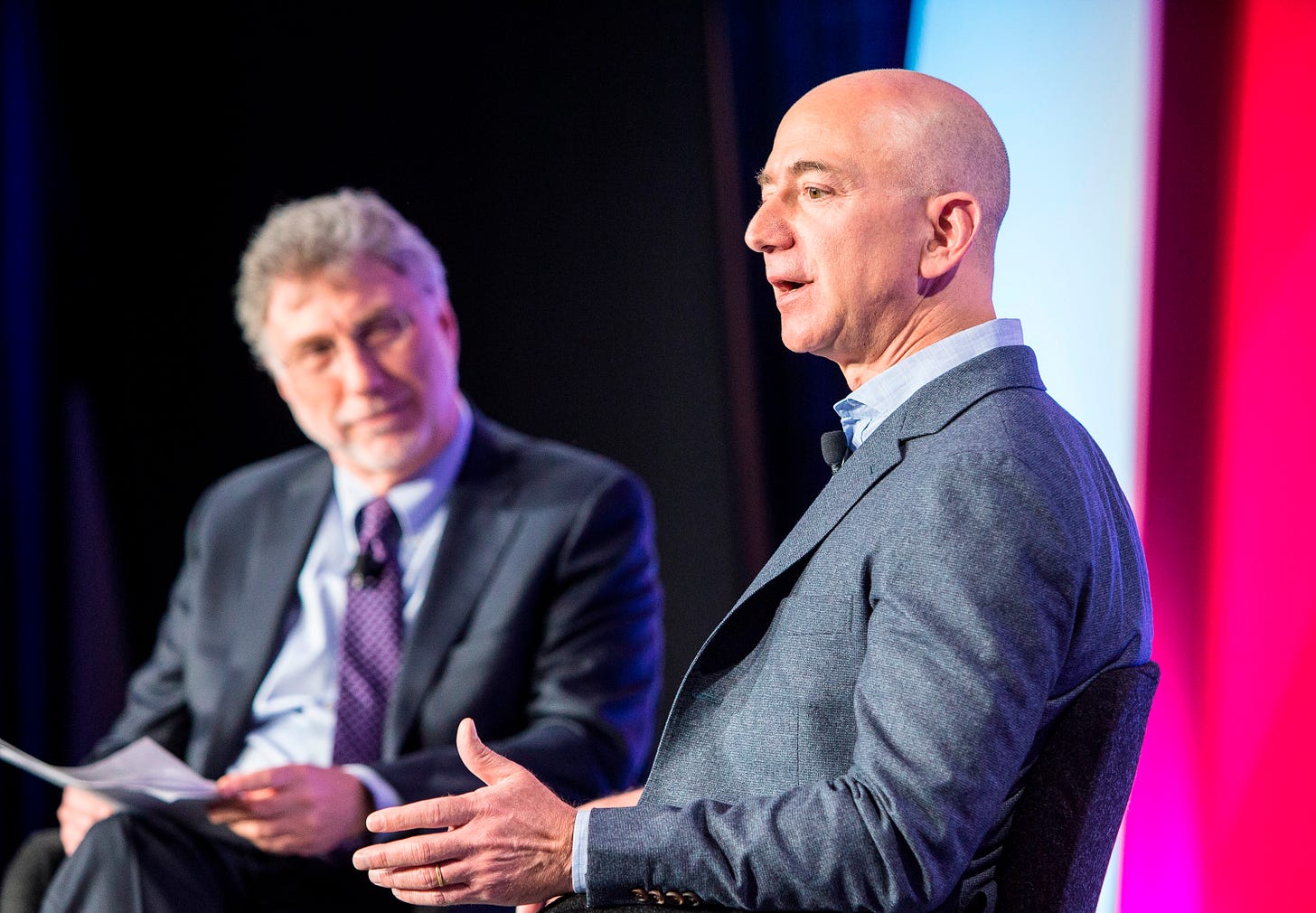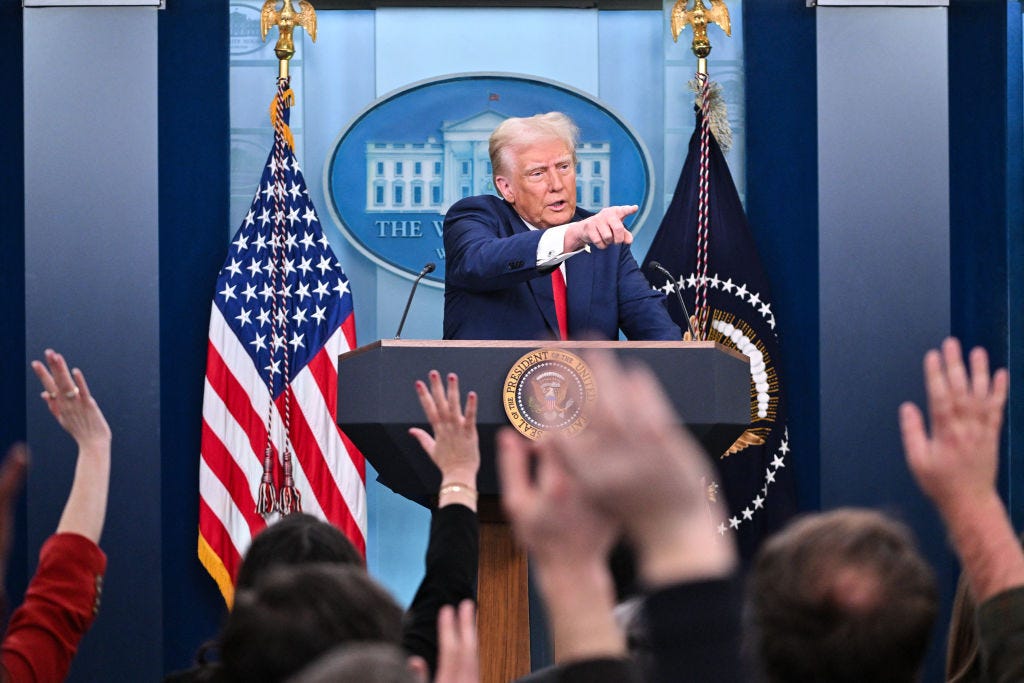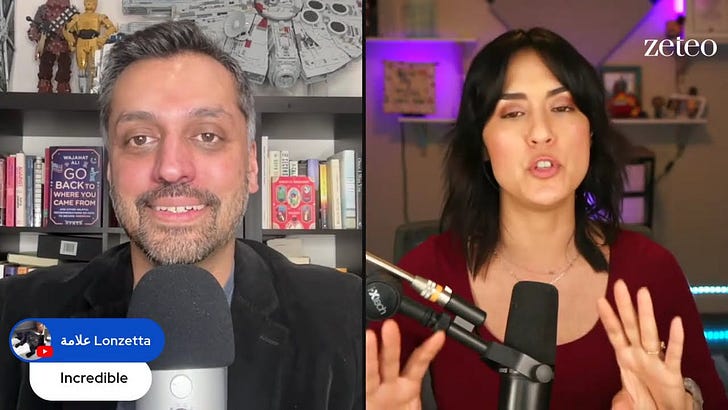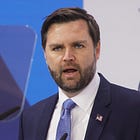'Craven. He's Fearful of Trump': Marty Baron Slams Jeff Bezos' Censorship of Post Opinion Section
EXCLUSIVE: The acclaimed ex-Washington Post editor on billionaire media barons and growing threats to the free press.

During the first Donald Trump presidency, Martin Baron may have been America’s most important journalist. As executive editor, he led the Washington Post as its dogged team of reporters held the president to account for everything from Trump’s dubious claims of charitable donations to Russia’s interference in the 2016 elections on his behalf.
The paper that exposed the Watergate scandal that brought down President Richard Nixon described its 21st-century mission with the catchphrase, “Democracy Dies in Darkness.” Baron’s leadership enjoyed the backing of Post owner Jeff Bezos, the founder of Amazon and one of the world’s richest men.
Things are different now. Baron, who led newsrooms to more than a dozen Pulitzer Prizes, retired in early 2021. Trump’s agenda has grown more frenetic and extreme. Bezos has joined other corporate titans seeking the president’s favor, provoking an exodus of Post reporters who fear the newspaper will no longer support unflinching coverage.
I talked with Baron about the altered political landscape of 2025, and how journalists should navigate it. Baron also railed against his former boss for Bezos’ decision to refocus the Post’s opinions section on defending “personal liberties and free markets.” Here’s more from our conversation, edited for clarity and brevity:
The shifting political environment has affected the behavior of the top levels of American media, by which I mean ownership. Jeff Bezos, your old boss, announced today the paper’s opinion section will focus on “personal liberties and free markets” and “viewpoints opposing those pillars will be left to be published by others.” What do you make of that?
BARON: It’s craven. He’s basically fearful of Trump. He has decided that, as timid and tepid as the editorials have been, they’ve been too tough on Trump.
He’s saying they’re going to have an opinion page with one point of view. That’s an invitation to the editorial writers and the columnists to take a hike. That’s really extraordinary (considering) everything he has said in the past. It’s a Post that’s not going to be for all of America. At a time when we’re talking about freedom and democracy, he saying there will not be freedom and liberty on our own pages.
Does this signal that he’s going to be interfering with the news pages, too?
BARON: I hope not. I haven’t seen any evidence he’s interfering with the news pages. If there’s even a hint of that, the Post will lose everything - all its credibility. But look, Trump’s going to get pissed off over the news pages. We’re at a point where we’re not having a difference of opinions, we’re have a difference about what the facts are.
Why do you think he did this?
BARON: He’s prioritizing his other businesses over the Post. Amazon has a big cloud computing business. Blue Origin is wholly dependent on the US government. Trump can just decide that they’re not going to get any contracts. Is he going to put that at risk? Obviously, he’s not going to put that at risk.
Last year, Bezos also directed the Post not to endorse a presidential candidate, and he gave money to the inauguration. What is your view of how media owners have responded to the shifting political environment?
BARON: I’ll just address Bezos because that’s the one I know the best. I’ve been incredibly disappointed and upset by what has happened. His decision to kill an endorsement, his decision to run commentary seeming to blame the newsroom for lack of public confidence, the donation to the inauguration via Amazon. The purchase of the rights to Melania Trump’s book paid $40 million, which, according to the Wall Street Journal, is three times the amount offered by the second-highest bidder. Being on the dais during the inauguration, sitting right behind Trump and in front of members of the Cabinet – that was a disturbing image.
When he wrote his piece talking about why they didn’t endorse [a candidate] for president, Bezos said all of us need to work harder to establish our credibility and our independence. I think that signals not independence but dependence. And the dependence comes from all of the contracts Amazon has with the federal government for cloud computing, and also Bezos’ private commercial space venture Blue Origin. I think he detected correctly that Trump would be more vengeful even than he was during his first term.
I was also disturbed by an interview Bezos gave to the New York Times in which he said inexplicably that he thought Trump had become more calm and settled. Sadly, the New York Times reporter there did not ask the follow-up question, which would’ve been, ‘Really? How so?’ To my great disappointment, he did not talk eloquently about the importance of the Washington Post and an independent media, about its role in a democracy, and how it’s inappropriate for someone who is president to be threatening the press.
Is our industry fated to have owners with that sort of dependent relationship, or is there a route back to the Chandler and the Grahams, the people who were willing and able to stand up and not go along?
BARON: If you know of anybody, let’s tell them it’s a really great time to get into the business. There is no perfect form of ownership – I’ve learned that over the years. Back when we had publicly-held companies, everybody was complaining they were managing their companies only to get the stock price up and not investing for the long term. And that turned out to be true. We have corporate owners like Disney and Paramount that have other commercial interests they worry about. You have private equity, which has turned out to be disastrous in managing media companies. They’re trying to extract every last penny out of them before they die. And then you have nonprofits, which a lot of people put their hopes in. But where do nonprofits get their money? They get it from elites, too.
It would be great if there were all these public-spirited people who had billions of dollars, and they didn’t have to worry about the financial performance of these companies. But sadly, that’s just not the case.
When you were the editor of the Post, you had a slogan: ‘Democracy Dies in Darkness.’ When you look at the situation right now, is democracy dying in broad daylight?
BARON: Well, it’s eroding, that’s for sure. I don’t know that I’m ready to declare its death by any means, but we’re certainly seeing our democracy erode. There’s no question about that. I think that this administration is taking measures that are weakening the pillars of our democracy.
How would you compare what you’re seeing in the opening weeks of Trump 2.0 to Trump 1.0?
BARON: In his first administration, he was really unprepared for the job, and so was sort of feeling his way. He was acting in a fairly disorganized and chaotic way. Right now, with Trump 2.0, he clearly has a plan. It appears to be a plan that was prepared for him, Project 2025, even though he said he had no idea what it was or who was behind it. And he seems to be following that plan in a very disciplined way.
And how would you assess the performance of the mainstream press in covering and responding today versus eight years ago?
BARON: I think the mainstream press has done a pretty good job, actually. I realize that runs counter to some narratives out there. I think we’re seeing a lot of reporting about what’s actually happening behind the scenes. There’s been some good reporting by the major news organizations and some additional ones as well.
People have taken note that Wired has done a really good job of reporting on DOGE, particularly its intrusions into people’s private information. His appointees are systematically trying to obstruct access to information to a degree we didn’t even see during the first term.
Something you said during the first Trump administration was, “We’re not at war, we’re at work.” Is that still the posture for the mainstream press?
BARON: I think it’s the right posture. We have a mission. It was a mission essentially assigned to us by the founders of this country: freely examining public characters and measures. And by the word examining, it means going beneath the service and behind the curtain – not just being stenographers. I think that’s what we have to do.
Our job as journalists is to tell the public what it needs and deserves to know so that they can govern themselves. To the extent we take the position that we are warriors in some sort of ongoing battle with the administration, we fall into a trap that I believe this administration wants us to fall into – a trap that would allow them to portray us as political opponents, not as independent arbiters of fact. If you have that mentality, it can take you down a lot of bad paths. You don’t rigorously examine what the facts are with an open mind.
How does the press respond in a more neutral way when you have brazen attempts to, let’s say, punish the Associated Press for not calling the Gulf of Mexico the ‘Gulf of America’? Or regulators opening investigations and talking about removing the licenses of news networks that edit interviews in ways they don’t like?
BARON: I didn’t use the word ‘neutral,’ I said ‘independent.’ I’m not talking about false equivalence. I’m not talking about false balance. The whole purpose of reporting is to get at the facts, get at the context, and tell the public what we’ve actually learned to be true. And not disguise that by pretending there are always two sides to something when, in fact, there aren’t.
With regard to the AP or the chairman of the FCC’s efforts to penalize networks for no good reason, we’re adamantly opposed to that. We do have to think through what measures we should take that can help counter what the president is doing to obstruct the press. I would expect there to be litigation, and I would hope the press will support collectively that kind of litigation. All for one, one for all.
What is your view of the calls to boycott press briefings or press conferences? Is that a constructive step?
BARON: I don’t think so. Probably, the White House would say, ‘Great, we didn’t want you here anyway.’ I do think there’s an opportunity to say, ‘If you exclude any one of us, then our information is available to that news organization you’re planning to exclude.’ All of our photos, all of our video. That doesn’t solve the problem for the AP, but it would be, I think, a significant measure.

Do you consider false equivalence to have been something that the mainstream press was guilty of? Is that a legitimate problem that has contributed to the situation the country finds itself in right now?
BARON: I didn’t see a lot of it. I realize the mainstream press was accused of that regularly. Yeah, sure, were there some examples of that? I think there were. But not as a rule. I hate to generalize across the press. All of us are different. All of us make our own decisions. Nobody says all doctors, all plumbers, all electricians, all lawyers do this or that. I don’t think false equivalence was a huge problem, nor do I think it’s the reason Donald Trump is in office today.
His supporters, for the most part, are not reading the kind of press you’re talking about. About a third of the American public doesn’t really turn to any media outlet. They get what they consider to be news from friends and family and across the transom – they can’t even identify where. A huge portion of Trump’s followers are getting their news from Fox News and outlets like it that affirm their pre-existing view of the world. I don’t think that anything really in the mainstream press is the reason that we have Donald Trump today.
Most of our audiences already agree with the way we see the world, so that limits the potential upside for acting in a different way. Do you agree?
BARON: It’s true. The percentage of readers of the New York Times who are conservative is in the single digits. The same is true of the Washington Post. Media consumption today is just highly polarized. I do think there are some steps we can take to improve those numbers.
What are those steps that you’re thinking of?
BARON: A lot of people in this country feel that mainstream media is completely out of touch with their lives. Most of mainstream media is based on the coasts. We don’t have nearly enough people around the country reflecting the struggles, the aspirations, the expectations of people who may not see the world the way we do. What their lives are like, what they’re having to deal with, why they’re so aggrieved. They’re not getting paid what they used to be paid. There aren’t opportunities for their kids. There are social problems in their communities.
Whether they should blame the press or so-called elites for that is another matter. But they do, and they are struggling. They need to see that we’re paying attention to them. Another thing I think we need to do is be way more transparent about our work. Show people how we did our stories. If there’s a court document, show the whole court document. Same thing with audio or video or any data set, with the message being: check our work, and let us know if you think we did something wrong.
CBS, in their interview with Kamala Harris, would have been well-advised to publish the entire transcript at the time they aired the interview. Even though traditional media are communications companies, they’re failing to communicate.
You mentioned the FCC’s unjustified pursuit of news networks. Should stories say that we are opposed to them and bluntly characterize what we believe it is, as opposed to a ‘he said, she said’ kind of thing?
BARON: Just because you don’t say we’re opposed to this doesn’t mean you’re doing ‘he said, she said’ work. One can write these stories making clear that these are unprecedented actions by the FCC, and that previous commissioners see this as an infringement upon First Amendment rights. I don’t think it’s going to be any mystery whether we think this is something that’s unusual and outrageous. I don’t think you have to use the kind of language you’re suggesting. And in fact, I don’t know that that’s terribly helpful.
Do you think there’s anything about this moment that calls for any adjustment in tone, or focus, or aggressiveness?
BARON: I think we should be aggressive in our coverage. I think we should report, and report more and report still more. When you see 19-year-olds and 20-year-olds getting access to Treasury payment systems, there was immediate public reaction against that.
We do ourselves a disservice by imagining that good, hard, aggressive reporting doesn’t have an impact, and we have to become like opinion columnists. We can leave that for commentators of various stripes. Good, hard reporting – that’s hard to come by. Everybody has an opinion. That’s the cheapest thing in the world.
In some cases it’s a hard line to draw between opinion and analysis. When you have a set of actions that look plainly anti-democratic or destructive of the rule of law or corrupt, what is the role of normative judgments being stated as matters of fact? Is it a fact to say that Donald Trump is siding with an authoritarian over a democratic leader in Ukraine?
BARON: The reporting says that. Certainly, the line between opinion and analysis can be difficult to draw and difficult to discern. It’s important that we be direct in our language – that we be blunt when necessary. But I still believe there’s a difference between opinion about policy and an articulation of the facts.
In the first Trump administration, many journalists had a debate over whether to use the word ‘lie,’ or do you say, ‘falsehood’ or ‘stated without evidence.’ Are you comfortable with where journalism has landed with that kind of terminology?
BARON: Not everybody has landed in the same spot. We’re much more willing to use the word ‘lie’ because it’s become clear he knows what he’s saying is not true. The clearest example of that is the 2020 election. We were careful at the beginning. Once you use a word, you can’t take it back.
We should just make clear that what he’s saying is not true, and that he has absolutely no basis for saying that. The crash at Reagan National Airport, where Trump starts blaming DEI the very next day without any investigation – preposterous.
Do you see anything different the press ought to do to address the larger issue of disinformation, whether it’s from Russian propaganda or news outlets that are not reality-based?
BARON: It’s going to get worse with generative AI as well. It’s a really tough thing. I do think we, as organizations, need to collaborate, working with academic specialists. They tend not to work at the same pace that journalists do, but I think the times call for working a lot faster immediately because so many of these falsehoods are distributed to hundreds of millions of people instantaneously. They become increasingly difficult to detect and disprove.
Is there a viable path for legacy media organizations?
BARON: I don’t think we can afford not to be optimistic. What we do is way too important. And I just don’t know anybody who has succeeded by expecting to fail. I’ve seen so many predictions of failure that didn’t turn out to be true. Back in 2009, people were predicting that the New York Times was going to go bankrupt. Well, guess what? They were able to figure out the digital era. They made some very significant and wise strategic moves.
When I arrived in 2013, there were so many people writing off the Washington Post. We did get a new owner. He did have a new vision. He did invest in it. He did give us our independence, for which I’m incredibly grateful, even though I’m disappointed with what he’s done more recently. We had six straight years of profitably that nobody sitting in 2013 anticipated would occur. I see successful entrepreneurial outlets with Axios and Punchbowl News and places like that. I’m not ready to give up.
Did your experience tell you that Trump was on to something about ‘woke’ culture, and do you see that getting any better in the news business?
BARON: In some segments of newsrooms today, there are people who are not working hard enough to understand the rest of the country. Our job as journalists is to not just reflect our own life experiences, because our own life experiences are narrow.
Do I think we can do a better job of that? Yes, I do. Do I think that Trump and other people have detected that weakness in our newsrooms? Yeah, I think he has. I think we need to do better.
John Harwood is the former chief Washington correspondent for CNBC and White House correspondent for CNN. He has interviewed every president from George H.W. Bush to Joe Biden. Sign up for the ‘The Stakes with John Harwood’ to get all of his columns in your inbox.
The views expressed in this article are the author’s own and do not necessarily reflect those of Zeteo.
ICYMI – Check out more from Zeteo on Trump 2.0:






After many years of subscribing to the digital version of The Washington Post, I will not be renewing. My subscription runs out in a month.
They now have few hard-hitting stories. Most of my favorite columnists have left. Quite a few of their editorial staff have left. They refuse to provide a partial refund to what is essential a completely different newspaper.
Darkness is killing Democracy.
I have also cancelled my subscription to WP, and NYT, because they can’t be trusted and I refuse to line bozo’s pockets. Their egregious lying about the situation in Gaza and their blind support of Israel’s narrative in the face of overwhelming evidence to the contrary, was the deciding factor. MSM IS the reason, or at the very least a main reason, that we are where we are today.